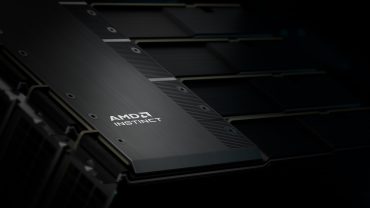

AMD’s Next-Gen Instinct GPUs Pack 288GB Memory and Win Major AI Company Adoption
Three Key Facts
- AMD’s data center segment achieved 57% year-over-year revenue growth, reaching $3.86 billion in Q1 2025, with operating profit surging 72%
- Seven of the 10 largest AI companies now use AMD Instinct GPUs, including OpenAI, Meta, and xAI
- The new MI355X GPU features 288 GB of HBM3e memory with 8 TBps bandwidth, supporting AI models with up to 520 billion parameters on a single chip
Introduction
AMD positions itself as a formidable challenger in the AI data center market with the launch of its Instinct MI350 series GPU accelerators at the Advancing AI event in San Jose, California. The company unveiled significant hardware and software advancements designed to compete directly with industry leaders.
The announcement centers on AMD’s comprehensive approach to AI infrastructure, combining new silicon capabilities with enhanced software platforms. These developments represent the company’s strategic push to capture market share in the rapidly expanding AI data center segment.
Key Developments
The Instinct MI350 and MI355X represent AMD’s latest server AI accelerators, built on the new CDNA 4 architecture. The MI350 features passive cooling for standard applications, while the liquid-cooled MI355X increases Total Board Power to 1400W and doubles rack density to 128 GPUs per rack.
AMD utilizes TSMC’s N3 and N6 process nodes for the MI350 series, introducing 3D hybrid bonding technology. This approach stacks an Infinity Fabric die, two I/O dies, and eight compute dies, creating a more compact and efficient design than previous generations.
The company simultaneously launched ROCm 7, its open-source GPU software platform. This release introduces native PyTorch support on Windows and enhanced portability across AMD platforms, supporting 1.8 million models on Hugging Face with significant performance improvements over ROCm 6.
Market Impact
AMD CEO Lisa Su revealed that seven of the 10 largest AI companies now deploy Instinct GPUs in their operations. This customer adoption demonstrates the company’s growing credibility in enterprise AI applications and represents a significant shift in market dynamics.
The company claims a 3x performance improvement over the previous MI300 generation for AI training and inference tasks. According to Forbes, these innovations underscore AMD’s commitment to competitive data center AI solutions.
Industry analysts project AMD’s AI chip sales could reach between $13 billion and $15 billion in 2025. The company’s data center revenue already shows strong momentum with 57% year-over-year growth, reaching $3.86 billion in the most recent quarter.
Strategic Insights
AMD’s roadmap extends through 2027 with planned releases following an annual cadence. The company unveiled the Helios AI rack architecture for 2026, featuring the Zen 6 Epyc processor, Instinct MI400 GPU, and Pensando Vulcano AI NIC with UALink networking support.
The Helios architecture emphasizes rack-scale optimization with 50% increases in HPM memory capacity and bandwidth compared to current solutions. This manufacturer-backed approach targets improved economics and performance for large-scale AI deployments.
Looking further ahead, AMD outlined plans for the MI500 series GPUs and corresponding systems for 2027. These future products will target competitive positioning against upcoming platforms from rivals, maintaining AMD’s commitment to consistent innovation cycles.
Expert Opinions and Data
CEO Lisa Su emphasized AMD’s substantial investments in data center GPU development, stating the company has created chips and systems that “compete head-to-head with the fastest” available options. She characterized the Helios AI rack as specifically architected for demanding AI workloads.
The technical specifications support AMD’s performance claims. The MI355X and MI350X GPUs incorporate 288 GB of HBM3e memory with 8 TBps memory bandwidth, enabling single-chip support for AI models containing up to 520 billion parameters. The architecture reduces I/O dies from four to two while maintaining enhanced performance.
AMD’s server market share approaches 40% as of the first quarter, positioning the company to potentially match Intel’s traditional dominance in this segment. Operating profit in the data center division grew 72% year-over-year, indicating strong margin expansion alongside revenue growth.
Major industry partnerships validate AMD’s strategic direction. Companies including Meta, Microsoft, and OpenAI participated in the Advancing AI event, highlighting collaborative relationships in AI infrastructure development. Notable international expansion includes Humain’s plans for extensive data center construction in Saudi Arabia using AMD technologies.
Conclusion
AMD’s comprehensive product launches demonstrate the company’s systematic approach to AI data center competition. The combination of advanced silicon, enhanced software platforms, and strategic partnerships creates a foundation for sustained market participation.
The financial performance metrics support AMD’s growth trajectory, with strong revenue increases and expanding profit margins in the data center segment. Customer adoption among major AI companies validates the technical capabilities of AMD’s offerings.
These developments position AMD as a credible alternative in the AI infrastructure market, narrowing competitive gaps through consistent execution and innovation across hardware and software platforms.








